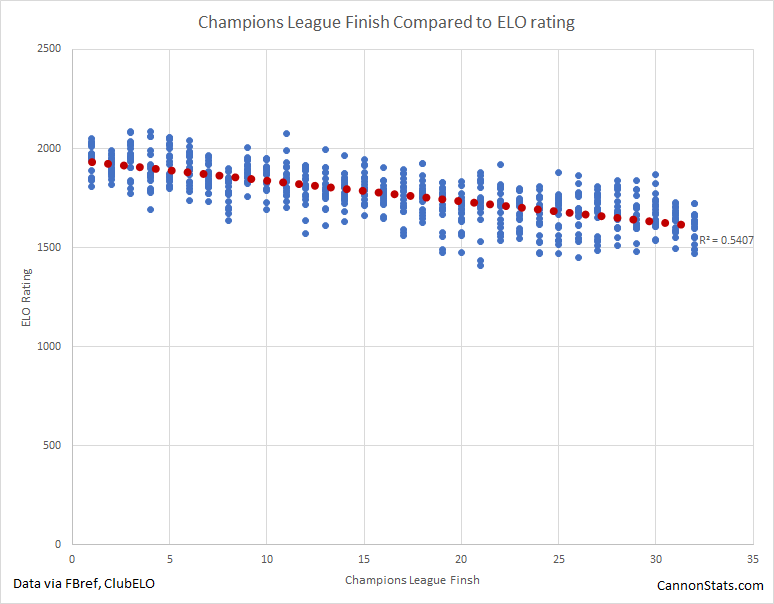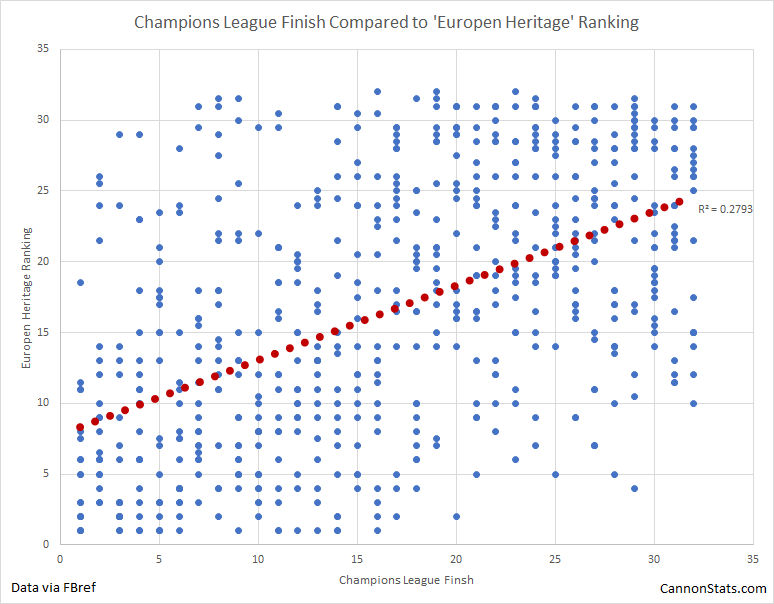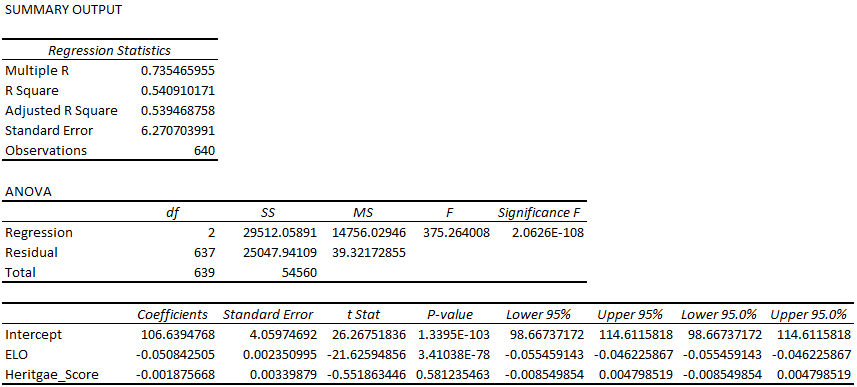Does Champions League 'Heritage' Matter?
What the historical data shows about past teams performance means for the future
When the Champions League knockouts roll around and people start talking about the favorites to win the tournament one thing that is almost always brought up is usually an established older team, perhaps a bit down, being able to call upon their heritage to help boost their odds.
This isn’t the experience of the players in the tournament (teams without heritage can still buy players with experience), although I would love to try and test that theory out and maybe someone with more time or better skills can, I am talking about the team having won things, or having been a constant fixture at the latter stages of the knockout rounds.
To test this I have pulled all of the Champions League data from FBref.com since the competition was expanded (1999-2000) and combined that with data from ClubElo.com to use as the measure of team quality (taken from January 1 of the season, I used this date because it is generally the midpoint of the season). If you want to play around with the data I have uploaded it here.
I have also created a ‘Champions League’ finish metric, this takes how far a team advances and then uses points per match and goal difference to break ties for teams that go out in the same stage of the tournament. This will be the key measure that I use to measure the other metrics against.
The hypothesis that I have seen and what I want to test here is that a team’s historic ability acts as a bonus measure helping them to perform better than just team strength.
The first place to start is with the assumption that team strength (as measured by ELO rating) is a decent measure.
Looking at a quick correlation between rating/ranking and team finish in the Champions League this does at least give a solid baseline to see if adding a measure of ‘Heritage’ can help make these relationships stronger.
The next step is trying to come up with a measure of Champions League Heritage, using just previous wins, or finals/semi-finals could work and I will use that but for this I decided to create a simple one.
Heritage score:
1 point for being in the Champions League group stage previously
2 points for making the Round of 16
4 points for making the Quarter-final
8 points for making the Semi-Final
16 points for making the Final
32 points for winning the Champions League
These are the maximum points a team is assigned and it isn’t additive. I went with a simple doubling because I think advancing further is a factor but being a regular fixture in the regular rounds is also something that is part of the nebulous feeling.
The Regressions
Let’s start with our baseline ELO-only measure.
ELO does show a statistically significant explanatory factor, explaining about 50% of the variance in where a team ends up finishing.
Next is Heritage Score only.
For these regressions, I did limit the starting year to 2003-04 so that there would be a few years of history to measure for the early seasons. This is not ideal and I would have loved to go back and add more but I had limited time and wasn’t able to. This (plus other things) will go in the limitations section.
Heritage score is also a statistically significant explanatory factor, but it is not nearly as strong as simply using team strength, explaining roughly a quarter of the variance in a team’s finishing rank.
Using where the Heritage score ranks helps boost the explanatory factor further.
Heritage score ranking is a significant explanatory factor, explaining a bit under a third of the variance in a team’s finishing rank. It is better than the score alone (which I think makes sense with the limitation of the historical data) but not as strong as ELO rating.
Now for the real meat of the testing, using team rating plus ‘Heritage’ to see if this combination can make a stronger duo.
It does not seem that using the score value adds much to the explanatory value. In this regression, the ‘Heritage Score’ variable also doesn’t end up being statistically significant.
Using the ranking which was a stronger variable by itself doesn’t give any more explanatory power to the regression.
Doing a final kitchen sink type regression and putting a bunch of variables in can eke out a bit more R2 but it is just a bit.
This also comes with all the variables outside of ELO rank not being statistically significant. You also see the signs flip on heritage rank and score from where you would have expected them to be to show that a team with more Heritage performs better.
Takeaways
I think the last regression really hammers the point home for me, using a measure of a team’s heritage and past performances can give a tiny boost but it pails in comparison to the truism that talent still is the biggest factor.
This is far from a perfect measure and maybe if it can be measured and captured better the explanatory power would become more evident. I would still come in with some doubts about it but perhaps as a marginal factor it could be the case, it is probably just very much subordinate to talent, injuries, and luck of the draw for how much of a factor it is in where a team finishes in the Champions League.
Limitations and things I would like to try to expand on:
No data on player-level experience. It would be very helpful to try and control for this and maybe also try and see if this can be teased out.
The measure of a team’s ‘Heritage’ could be improved or changed. I don’t think this is close to a perfect measure and if someone has a better idea it would be great to test it.
History for this dataset only goes to 2003-2004, which gives a 20-year sample but it would be nice if the measure of a team’s ‘Heritage’ went back even further. The data wasn’t as readily available and it will become a bit harder to square because the Champions League looked different before this, having just 16 teams vs 32.
Trying to factor in a team getting a group of death, or an easy path to a final playing lesser teams would be interesting to try and measure.
Injuries are a big deal for how good a team is and that would be slow to be incorporated into the ELO rating.
A measure of a coach or style of play would be another interesting thing to try and factor in. I don’t have a good idea of how to measure that right now but it would be fun to see how it translates.












Thanks for an interesting analysis. I have always assumed that past experience matters—but it makes sense that team talent, as shown by ELO, is a better predictor. It’s also interesting because it reinforces slightly the predictive value of the ELO rankings(on which Arsenal recently reached its highest rating). Good question and interesting answer. Thanks.